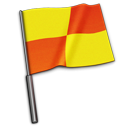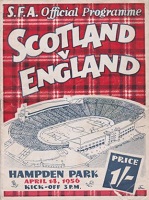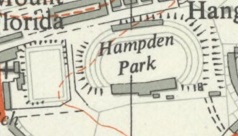 flg.jpg) "SEND
FOR STAN!"
Sunday Mirror "SEND
FOR STAN!"
Sunday Mirror |
  Officials
from Wales Officials
from Wales |
Scotland |
UK ruling on substitutes |
England |
Referee (maroon)
Leo Callaghan
32 (5 February
1924), Merthyr Tydfil |
Teams were presented to the Guest of Honour, HRH The Duke of Gloucester,
KG.
|
|
Linesmen |
N.A. Jones
Wrexham |
G.H. Lewis
Aberdare |
|
|
|
 Scotland
Team Scotland
Team |
| |
|
Rank |
No official ranking system established;
ELO rating 16th to 15th |
Colours |
Made by Umbro -
Dark blue continental jerseys with white v-neck collars/cuffs,
white shorts, blue socks with red tops. |
|
Captain |
George Young |
Selection |
The Scottish Football Association Selection Committee
on
Saturday, 1 April 1956. |
|
Trainer: Alec Dowdell (The Celtic FC) |
 Scotland
Lineup Scotland
Lineup |
|
|
Younger, Thomas |
26
4 days |
10 April 1930 |
G |
Hibernian FC |
7 |
9ᵍᵃ |
|
2 |
Parker, Alexander H. |
20
256 days |
2 August 1935 |
RB |
Falkirk FC |
6 |
0 |
|
715 |
3
 |
Hewie, John D. |
27
124 days |
12 December 1928
in Pretoria,
South Africa |
LB |
Charlton Athletic FC, England |
1 |
0 |
|
4 |
Evans, Robert |
28
273 days |
16 July 1927 |
RHB |
The Celtic FC |
25 |
0 |
|
5 |
Young, George L. |
33
170 days |
27 October 1922 |
CHB |
Rangers FC |
47 |
0 |
|
most apps
1952-56 |
|
6 |
Glen, Archie |
27
364 days |
16 April 1929 |
LHB |
Aberdeen FC |
2 |
0 |
|
final app
1955-56 |
|
716 |
7
 |
Leggat, Graham |
21
299 days |
20 June 1934 |
OR |
Aberdeen FC |
1 |
1 |
|
8 |
Johnstone, Robert |
26
220 days |
7 September 1929 |
IR |
Manchester City FC, England |
17 |
8 |
|
9 |
Reilly, Lawrance |
27
169 days |
28 October 1928 |
CF |
Hibernian FC |
33 |
21 |
|
10 |
McMillan, John L. |
25
27 days |
18 March 1931 |
IL |
Airdrieonians FC |
5 |
2 |
|
11 |
Smith, Gordon |
31
325 days |
25 May 1924 |
OL |
Hibernian FC |
16 |
3 |
|
reserves: |
Travelling reserve is Tommy Docherty (Preston North End FC).
Full team of reserves are
Billy Brown (Dundee FC); Ian Rae (Falkirk FC); Tommy Docherty (Preston North End FC),
Danny Malloy (Cardiff City FC) and Doug Cowie (Dundee FC); Gordon Smith
(Hibernian FC) and Bobby Collins (The Celtic FC); Willie Baird (Airdrieonians FC),
John McMillan (St. Mirren FC) and Jackie Henderson (Portsmouth FC). |
|
team changes: |
The Celtic FC's Bobby Collins was the original named inside-left, his place
going to McMillan, on 10 April because of a knee injury. |
|
The team
were set up in Largs prior to the match, practising at Barrfields
Stadium. |
|
|
|
2-3-5 |
Younger
-
Parker, Hewie -
Evans, Young, Glen -
Leggat, Johnstone,
Reilly, Collins, Smith. |
|
Averages: |
Age |
26 years 335
days |
Appearances/Goals |
14.5 |
3.1 |
|
|
|
flg.jpg) England
Team England
Team |
| |
|
Rank |
No official ranking system established;
ELO rating 6th |
Colours |
The 1954 Umbro
home uniform -
White v-necked short-sleeved continental jerseys, blue shorts, red
socks with white tops. |
|
P tenth of 43, W 5 - D 2 - L 3 - F 26 - A 14. |
|
Captain |
Billy Wright |
Manager |
Walter Winterbottom, 43 (31 March 1913), appointed as FA national director of coaching/team manager on 8 July 1946; |
|
record 58th of 90, W 33 - D 11 - L 14 - F 144 - A 89. |
Trainer: Jimmy Trotter (Charlton Athletic) |
P 76th of 139, W 46 - D 15 - L 15 - F 218 - A 110,
one abandoned. |
|
|
 ³ ³ |
|
Team chosen by Selection Committee, headed by Joe Mears, on Sunday, 8 April. |
flg.jpg) England
Lineup England
Lineup |
|
|
three changes
to the previous match
(Matthews, Edwards & Taylor>Baynham, Clayton & Atyeo) |
league position
(8 April) |
|
|
76 |
|
Matthews, Reginald D. |
23
116 days |
20 December 1932 |
G |
Coventry City FC
(FLS3 4th) |
1 |
1ᵍᵃ |
|
754 |
the first City player to represent England |
|
2 |
Hall, Jeffrey J. |
26
220 days |
7 September 1929 |
RB |
Birmingham City FC (FL 3rd) |
5 |
0 |
|
3 |
Byrne, Roger W. |
26
219 days |
8 September 1929 |
LB |
Manchester United FC
(FL CHAMPIONS) |
18 |
0 |
|
4 |
Dickinson, James
W. |
30
356 days |
24 April 1925 |
RHB |
Portsmouth
FC (FL 11th) |
45 |
0 |
|
5 |
Wright, William A. |
32
68 days |
6 February 1924 |
CHB |
Wolverhampton
Wanderers FC (FL 7th) |
73 |
3 |
|
most apps
1952-56 |
|
6 |
Edwards, Duncan |
19
196 days |
1 October 1936 |
LHB |
Manchester United FC
(FL CHAMPIONS) |
5 |
0 |
|
7 |
Finney,
Thomas |
34
9 days |
5 April 1922 |
OR |
Preston
North End FC (FL 16th) |
60 |
26 |
|
the second and oldest player to reach the 60-app
milestone |
8
 |
Taylor, Thomas |
24
76 days |
29 January 1932 |
IR |
Manchester United FC
(FL CHAMPIONS) |
6 |
2 |
|
9 |
Lofthouse, Nathaniel |
30
231 days |
27 August 1925 |
CF |
Bolton Wanderers FC
(FL 6th) |
30 |
27 |
|
the eighth player to reach the 30-app
milestone |
10
 |
Haynes, John N. |
21
180 days |
17 October 1934 |
IL |
Fulham FC
(FL2 11th) |
4 |
2 |
|
11 |
Perry, William A. |
25
217 days |
10 September 1930
in Johannesburg, South
Africa |
OL |
Blackpool FC
(FL RU) |
3 |
2 |
|
final app
1955-56 |
|
reserve: |
Tommy Cummings (Burnley FC (FL 9th)) |
|
team notes: |
Reg Matthews becomes
the first Third Division player to make a senior side appearance since Joe Payne
did so in
1937 (Tommy Lawton also did between 1947-48, but he was an established
international when he joined Notts County FC). Matthews was shaking so
much pre-match, that when he heard the 'Hampden Roar', the trainer,
Jimmy Trotter, had to treat him with smelling salts, before he
fainted.
Billy Wright extends his record appearance tally, in his record 38th
consecutive match. |
|
pre-match notes: |
On Tuesday, 10 April, England continued with the practise of meeting
up with a league club for a practise session, today, it was the turn
of Bolton Wanderers FC at Burnden Park. England won 4-2 with Finney
setting up all four for Lofthouse to score twice, and Haynes and
Taylor. Bolton's response came from Gubbins and Stevens.
The day
after, Wednesday, 11 April, England went to Turf Moor and were beaten
by Burnley by a single Brian Pilkington goal. |
|
records: |
England were quite literally 37 seconds away
from finishing bottom, which has not happened since 1928. |
|
The team then set up in Troon and practised at Ayr before the match. |
|
|
|
2-3-5 |
Matthews
-
Hall, Byrne -
Dickinson, Wright, Edwards -
Finney,
Taylor, Lofthouse, Haynes, Perry. |
|
Averages: |
Age |
26 years 306
days |
Appearances/Goals |
23.3 |
5.5 |
|
England teams v. Scotland: |
|
1955: |
Williams |
Meadows |
Byrne |
Armstrong |
Wright |
Edwards |
S.Matthews |
Revie |
Lofthouse |
Wilshaw |
Blunstone |
|
1956: |
R.Matthews |
Hall |
Dickinson |
Finney |
Taylor |
Haynes |
Perry |
|
|
|
|
Match Report
by Mike Payne |
|
 It
was in 1957 that England had last lost to Scotland at Hampden Park and the
run continued after this latest match between these old rivals. This time,
though, Scotland came so very close to ending the sequence. It is always a
special occasion when these two sides meet and it came as quite a
surprise when England chose Reg Matthews in goal. The selection of a Third
Division player raised a few eyebrows, but by the end of the game it was
most gratifying to see how well the lad from Coventry performed. It
was in 1957 that England had last lost to Scotland at Hampden Park and the
run continued after this latest match between these old rivals. This time,
though, Scotland came so very close to ending the sequence. It is always a
special occasion when these two sides meet and it came as quite a
surprise when England chose Reg Matthews in goal. The selection of a Third
Division player raised a few eyebrows, but by the end of the game it was
most gratifying to see how well the lad from Coventry performed.
Despite having much less of the possession,
England always created the better chances. This was due mainly to the
superb play of Johnny Haynes, who really looked a class above the rest.
His passing was a delight, although his forward line colleagues tended to
waste his best moments. Scotland, with Parker, Hewie and Young outstanding
in defence, rarely created a worthwhile goalscoring attempt and they
lacked someone of Haynes's ability to take advantage of their greater
possession. Even with a massive 132,000 crowd behind them, they still
struggled to find the target.
In
the first half Scotland managed only one decent attempt. This came in the
15th minute when Matthews made a brilliant diving save low down from
Johnstone. This gave the goalkeeper confidence and he went on to show the
calm authority that belied his inexperience. Evans was an inspiring worker
in midfield for Scotland and much of the play revolved around him. But
England could and should have scored twice in the opening period. But Nat
Lofthouse and Bill Perry squandered golden chances, the second one coming
from a rare burst of skill from Tom Finney.
The second half began
with both sides striving for the breakthrough. It finally came after 60
minutes and it was the Scots who went ahead. Johnstone began the move down
the right with a pass to McMillan. He, in turn, found Leggatt advancing
down the left. The winger centred and quickly moved into the middle to
receive a return pass from Smith. Leggatt then lobbed the ball over a
crowd of players and into the net with Matthews stranded.
The
'keeper had some excuse as Leggatt partially mishit his shot although it
did not matter to the massive crowd how the goal was scored as it was the
first time in nearly 20 years that Scotland had taken the lead against the
Auld Enemy at Hampden.
The goal stirred England into life, though
and, at last, they began to move more fluently. Wright, Dickinson, Edwards
and especially Haynes began to impose themselves on to the game and in the
last half-hour England stepped up a gear. They won a stream of corners and
Younger excelled when making fine saves twice from Taylor. Berry and
Taylor then missed when well placed and Haynes threw away a good chance
when his effort struck a post.
With the time ticking away the
excitement grew and at times only desperate clearances saved Scotland.
Finally, with the home side within seconds of that elusive Hampden
victory, England bravely snatched their deserved equaliser. Byrne moved
forward to add weight to the attack and put in a good cross to the head of
Taylor. His nod down dropped perfectly for man-of-the-match, Haynes to
sweep the ball past Younger.
The crowd were stunned into almost
total silence, not quite believing what had happened. The result also left
a unique situation in the Home Championship as all four countries finished
level on three points thus sharing the title.
|
|
Match Report
by Norman Giller |
|
Johnny Haynes silenced the Hampden Roar with a
last-minute equaliser, shooting the ball past goalkeeper Tommy Younger
after
Manchester United team-mates Roger Byrne and Tommy Taylor had created the
opening. Reg Matthews, making his debut in front of a 134,000 crowd while a
Third Division goalkeeper with Coventry City, pulled off a string of
magnificent saves and
was only
beaten on the hour by a mis-hit shot from Aberdeen's Graham Leggat. The
last-gasp equaliser from man-of-the-match Haynes stopped Scotland from
registering their first victory over the Auld Enemy at Hampden Park since
1937. The incredible thing about this match was that England had to call the
trainer on to treat goalkeeper Reg Matthews before a ball was kicked. Reg,
used to playing in front of fewer than ten thousand spectators in the Third
Division, was shaking with nerves as England left the dressing-room, and when
he heard the roar from the 134,000 Scottish fans he almost passed out. The
trainer gave Reg a whiff of smelling salts, and he quickly pulled himself
together and gave an excellent debut performance. Reg, who later played for
Chelsea, was nervy at the best of times and smoked like a trooper in the
dressing-room.
|
|
Match Report
as appears in the F.A. Yearbook 1956-57 page 30 |
|
The younger members of the England
team did all that could be expected of them in this match on April 14th at
Hampden Park. Nevertheless some of the 134,000 spectators thought that
Scotland were unlucky to be deprived of a victory by a goal scored by
Haynes in the last minute of the game. It was an even first half, with the
defences well on top. Parker, Hewie, and Young - a dominating centre-half
- were in devastating form for Scotland, and the England half-backs were
not far behind them. Matthews made two sensational saves before he was
rather unluckily beaten by a spinning lob from Leggatt with half-an-hour
to go. Then with the Hampden crows roaring for full-time, Haynes and
Edwards brought the ball through, Taylor headed it back to Haynes, and he
breasted it down before banging it into the corner of the net. That goal
meant that for the first time in the 72 years' history of the
Championship, England, Scotland, Wales and Ireland all finished level,
each having won one, lost one and drawn one of the three matches played.
|
In
Other News....
|
It was on 14 April 1956 that Chicago's Conrad Hilton Hotel
staged a groundbreaking demonstration of the latest
videotape recording machine to around 200 CBS employees and
affiliate partners. To widespread astonishment, video was
recorded and almost immediately played back on screen. Until
this point, recording could only be effectively achieved by
using a camera to film the output from a television monitor and then developing it to play
hours later. Ampex, the company that built the recorder and
developed the quadruplex tape required for the recordings,
sold seventy machines at $45,000 each following the
presentation and it was used for the first time, seven
months later, by CBS to transmit the same evening news
programme at the same time in each of the time zones across
the United States. Independent Television (ITV) were the
first to use it in the United Kingdom, in 1957. |
|
|
|
|
|
|
Source Notes |
TheFA.com
Original newspaper reports
Original matchday programme
The Complete Book of the British Charts
LondonHearts.com |
|
Rothman's Yearbooks
Mike Payne's England: The Complete Post-War Record
Norman Giller, Football Author
British Pathé |
|
|
cg |

